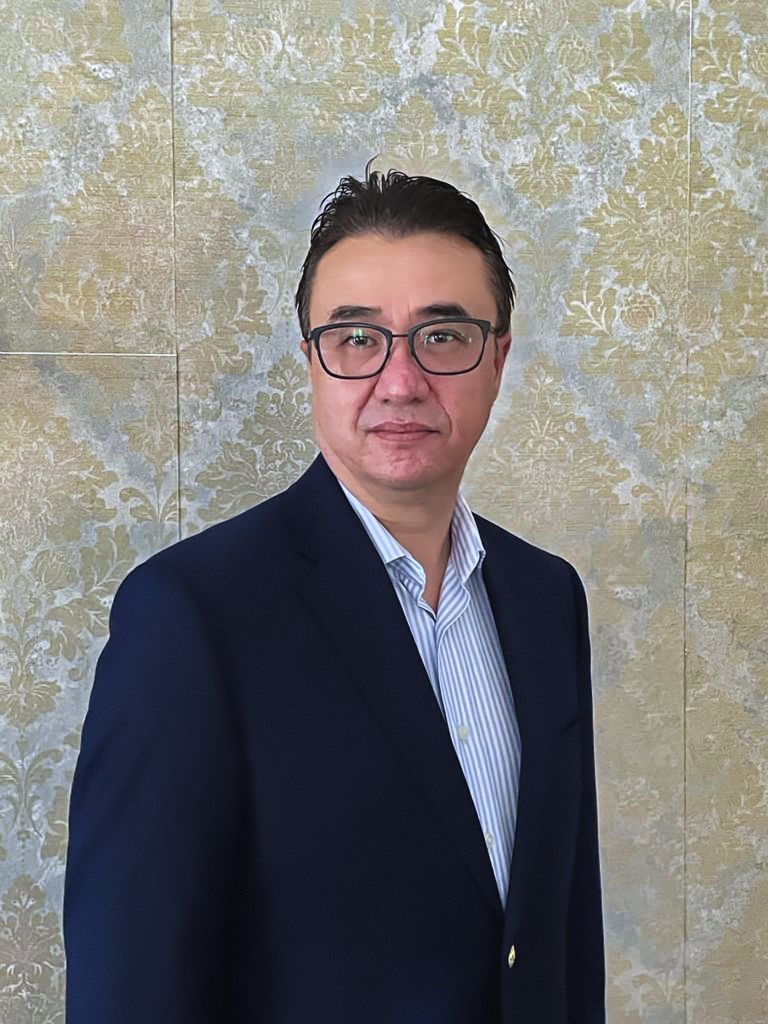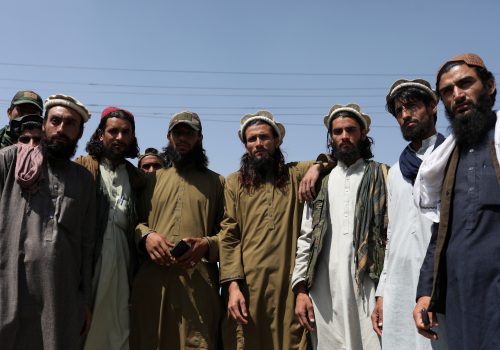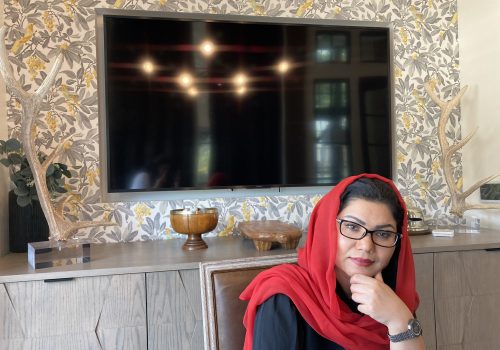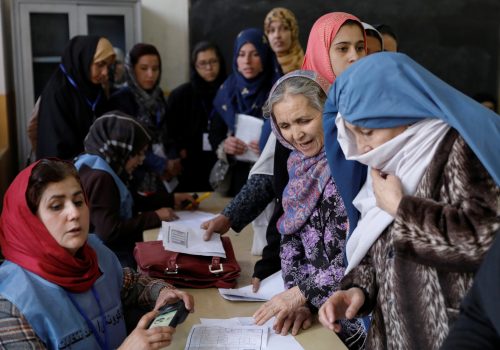Ambassador Barna Karimi has served under then President Hamid Karzai as Deputy Chief of Staff from 2005 to 2007. He became the Deputy Minister of Policy in the newly established Independent Directorate of Local Governance from 2007 to 2010 and was the acting minister of the same organization from 2010 to 2012 before becoming Afghanistan’s Ambassador in Ottawa, Canada. He is also a political and human rights activist.
This interview was moderated by Fariba Pajooh, a PhD student and journalist who has been reporting on Afghanistan, Iran, and the Middle East for over 15 years. She graduated from the Medill School of Northwestern University and has written for Iran’s Shargh newspaper as well as Euronews, Buzzfeed, RFI, and other outlets.
TRANSCRIPT OF THE INTERVIEW
FP: You were the Ambassador of Afghanistan in Canada and prior to that, Acting Minister of Local Governance in Afghanistan. Given your expertise as a specialist, please tell our audiences what contributed to the fall of the republic in Afghanistan. The reason for the fall of the Afghan army is still unclear to many analysts. What is your take and analysis of the situation?
BK: This can be a suitable structure to discuss the series of events and bad policies that resulted in the fall of the government in Afghanistan and the end of two decades of the world’s military and political presence there. I would like to discuss this in two parts, domestic issues, and international perplexity:
The political skirmishes between the US and Afghanistan’s governments began when Richard Holbrook in 2009 intervened in the presidential election and tried to rally the world against President Karzai. This was a political maneuver to apply a significant amount of political pressure on President Karzai to accept the chief executive position within the government. Holbrook could not get along with President Karzai and he lobbied within the US administration and congress to find a reliable partner for the world in Afghanistan. In 2008, after the US election, the relationship between President Karzai and the US was already diminishing to the lowest and weakest possible level, so in Holbrook’s mind, it was time to find a new window for communication and perhaps applying the political agenda. Holbrook could not succeed. President Karzai took his action personally and blamed the US government for plotting against him. The next five years were drawn in blaming, political skirmishes, and media announcements against civilian casualties by President Karzai and the corruption allegations against the government of Afghanistan by the US and allies. In this period, President Karzai’s daily schedule was mostly filled with political meetings, public gatherings, and media appearances, complaining and blaming the US policies and military operations, he did not pay much attention to governance, security, or development. The cabinet was fractured and frustrated, and so many different agendas were conceived and inserted by various partners, so the ministers and governors acted more on their own and based on their routes of political and financial resources.
Ashraf Ghani, who just lost the election by a deficient and embarrassing number of votes in 2009, had nothing to do and voluntarily joined President Karzai’s administration. He first took the job of arranging the Kabul Conference in 2010 and then became the coordinator of the security transition from NATO to Afghan forces. He managed to travel around the country and created a structure for the next presidential election in this role. On August 15 of 2021, the fall of the government started right when former President Ghani and Chairman Abdullah agreed to share power and create the Unity Government in 2014. From that day, what the people and government of Afghanistan suffered during the five years of ruling were the result of internal political disputes between these two leaders, lack of attention to governing and security situations, restructuring of the government institutions for political purposes by Mr Ghani, competing in their relationship with the west, and destroying the social integration of ethnicities and clans within the community. Unfortunately, this situation worsened after the second election. Although the 50-50 cabinet position sharing was intact, only Abdullah changed his role from a CEO to a peacebuilder. Ghani now had a free hand to dismantle government institutions, maneuver personal political visions, and move public resources in corrupt practices.
FP: What has been the fundamental role of the United States in Afghanistan over the past twenty years? There are questions raised about Afghan leaders and some foreigners involved in corruption in Afghanistan. What’s your take on that?
BK: The US government decided to go after the al-Qaeda network seriously right after the 9/11 attack. Although US defense and intelligence communities were engaged and operating against them long before 2011 all over the world, carrying out the most significant military operation, or Operation Enduring Freedom, was the major blow to the terrorist network and dismantled the organization in Afghanistan. The Taliban under the leadership of Mullah Omar did not surrender or arrest Osama Bin Laden. They had no choice but to escape and avoid retaliation. After that, over the next twenty years the US tried to fight terrorism and the Taliban around the country, at once they had the biggest military presence in the history of over a hundred thousand forces in the country but ended up to what we saw, the disaster of August 15, 2021.
The United States started to create reliable governmental structures in Afghanistan to be the world’s partner in this fight; they supported the nation-building process, funded the government institutions, NGOs, and even directly implemented development projects. At once, the US army had over 200 Forward Operating Basis (FOB) around the country, all equipped with modern warfare equipment and millions of cash in Commander Emergency Reconstruction Projects (CERP) budgets. They spent billions of dollars in USAID projects, including support to governance and the rule of law projects. In fact, the US army could not operate in Afghanistan unless they had a reliable government partner installed in the country and a community to accept them as foreign but helping institutions for this purpose; they had to compensate people with massive developmental projects to win their hearts and minds. I remember when I went to Khost Provincial Reconstruction Team (PRT) in 2008, operated by US troops. The commander of the base had a huge banner behind him explaining the Pashtunwali rules and regulations—saying all the above declines the notion that President Biden now repeats in almost all his speeches, that the US never went to Afghanistan to create a government and get involved in nation-building. I believe that the US wouldn’t even last one month in Afghanistan if they did not pour millions into projects or did not install a partner government in Kabul and provinces. The United States and allies did support the local economy, develop massive and important major infrastructure, support the Afghan army and police, funded the government budget, but in the meantime and unfortunately sustained the project-based economy by paying very high prices for the construction projects, auctioning millions of dollars on a weekly basis to retain the currency value, and paying high salaries for the local employees. They gave us a lot of fish but never taught us how to fish. We had an army which was paid and equipped in full by NATO, but it was not created by a strategy of force projection or positioning, it was not clear when and how the country would take over the expenses, so the military never had a future, rather looking for the United States and NATO’s mercy to continue the support. The police were the same, if the gasoline was cut off by the donor community, we did not have law and order in the entire country.
I think twenty years of US presence in Afghanistan was full of success and failures. They succeeded in dismantling al-Qaeda and killing Osama Bin Laden, but if we look at it today, those boys hanging from the US military plane on August 16, one day, will become the west’s enemies because they were thrown away to the wolves. If they survive, they will be the most accessible generation to become fundamentalists and be recruited in terrorist organizations.
To conclude, as Secretary Lloyd and General Milley stated, Afghanistan was a strategic failure. The rushed and miscalculated Doha Agreement had a reversed outcome; the Taliban, from nine major promises, only did not attack the US forces and did not fulfill another eight. So, now the enemy is in charge of a country that we built with the lives of over 2700 US forces and over a trillion dollars in resources.
FP: What are the roles of Afghanistan’s neighbors in this current conflict including Iran, Pakistan, China, and Russia?
BK: The notion that the Taliban is a good political partner for the region’s countries is a hasty and false belief. The Taliban’s past has shown that they are not living up to any of their commitments. They may make a pact on paper to gain international legitimacy, but they will never live up to their promise.
The world’s intelligence agencies have repeatedly said that the Taliban have links to terrorist groups such as al-Qaeda. In addition, the Taliban have said in several interviews that they are thinking of creating an Islamic state and expanding the territory of the Taliban government. That means that they believe in what Muslims believed 1400 years ago. Therefore, a specific and extremist interpretation of Islam is the primary basis of their political, economic, and social interactions. Undoubtedly, forming the Taliban government with the international community’s support or with their silence is a big mistake. Second, the Taliban have not changed and will not change. After only a few weeks of their presence, they have restricted the media and prevented the publication of facts, especially in small towns. But there is bad news. Suppose the love or hate of the countries of the region or our neighbors for the former president, Ashraf Ghani, and his policies lead to the Taliban’s approval and silence against their crimes. In that case, the neighboring countries and the region will make an irreparable mistake. With its Taliban government, Afghanistan is made up of extremist clerics, which means producing extremism, spreading religious extremism, increasing narcotics cultivation, and increasing violence. The countries of the region should not be silent and watchful! The world is still struggling with several religious extremists and creating and strengthening such a government in Afghanistan is another mistake.
FP: One of the most important questions could be how the Taliban’s government can be a threat to US national security given the possible presence of al-Qaeda and ISIS in Afghanistan, as well as the issue of drug production and trafficking.
BK: Indeed, the Taliban are not reliable, nor they will be a partner in fighting terrorism. They will not be able to threaten the US or Europe’s national security. However, Afghanistan can fall again into the hands of terrorist organizations and would become a safe haven for many of them.
FP: Are these numerous groups credible in the form of the “Taliban”? Can the Taliban run Afghanistan?
BK: The Taliban will not be able to govern the country unless they make serious changes to their policies, creating a clear vision for the political future of the movement and the country. If the world puts the Taliban on their blacklist again, humanitarian assistance will not survive. Governing Afghanistan is not as easy as it was in 1996 to 2001. Now to run the country, you need to be intelligent enough to align with the world’s new order, strategize your defense, promote your geographical location with the neighbors, and sustain international fiscal and economic policies to be part of the world economy. The beating and fighting era will soon be finished, and the Taliban will be left alone with poverty, unemployment, lack of services, and wear and tear of infrastructure.
The voices of Afghan women demanding their rights from the Taliban are still heard in various cities. How long do you think the Taliban will tolerate the voices of critics in Afghanistan?
Unfortunately, women’s rights in Afghanistan have always been used as a political tool. In Ghani’s regime, some women ascended to a higher level of the cabinet, but they never exercised real political power in accordance with their presence and positions. Although in the last twenty years, we noticed a tremendous change in their social and economic condition, with the Taliban now in power, all the achievements were shattered. Now the Taliban will implement vicious inhuman policies against women just to ask for financial and political incentives from the world, but it will be the women of Afghanistan who will suffer the consequences, and their rights will be ignored for a long time.
FP: What is your opinion about the formation of resistance groups like that of Ahmad Massoud in the Panjshir valley?
BK: Experience has shown that any organization that fails to meet the needs of its community and imposes restrictions instead of meeting the challenges, in fact, provides the ground for more dissatisfaction and collapse.
Undoubtedly, the political past of the Taliban is black and unforgettable. This past has made no country recognize it, and on the other hand, people feel threatened. But, on the other hand, there has been no positive change in the Taliban, and they have sent no new message to the new generation of Afghans except intimidation. The people of Afghanistan are facing poverty and unemployment. One group of people has been forced to remain silent in the face of fear created by the Taliban, while another group has sacrificed their lives to fight and resist under the leadership of Ahmad Massoud. Afghan women are also dissatisfied with the current situation and are fighting civilly despite various threats.
If the Taliban want to rule, they must learn from the past and respond logically to the protests, not confront them. In addition, the Taliban must learn from the causes of their downfall in the past and pay attention to all groups and ethnicities.
Neither the world today is the world of decades ago, nor the people of Afghanistan are the people of twenty-five years ago. If the Taliban do not deal with the protests and resistance rationally, these voices may be silenced for a while, but they will continue to be one of the vital causes of their collapse. I believe Massoud’s resistance is an example of the new face of Afghanistan, and today, if it is concentrated in one province, it may spread in the future.

The South Asia Center serves as the Atlantic Council’s focal point for work on greater South Asia as well as its relations between these countries, the neighboring regions, Europe, and the United States.
Related content
Image: Ambassador Barna Karimi posing for a photo



